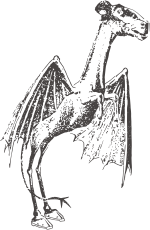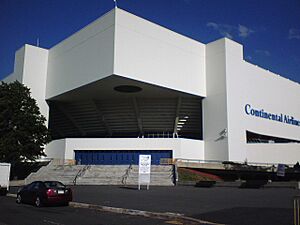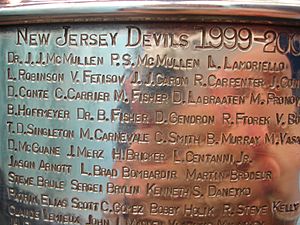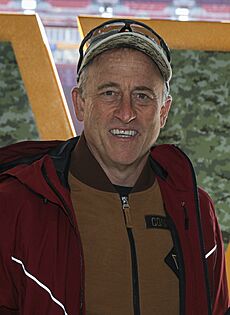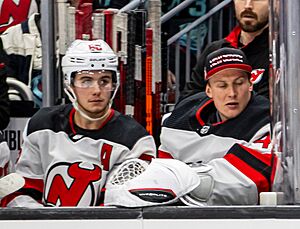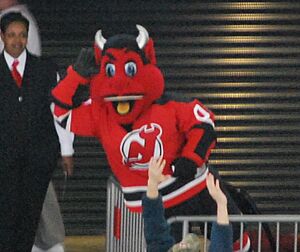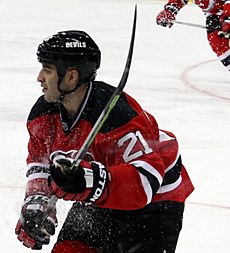New Jersey Devils facts for kids
Quick facts for kids New Jersey Devils |
|
|---|---|
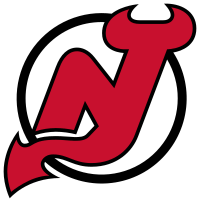 |
|
| Conference | Eastern |
| Division | Metropolitan |
| Founded | 1974 |
| History | Kansas City Scouts 1974–1976 Colorado Rockies 1976–1982 New Jersey Devils 1982–present |
| Home arena | Prudential Center |
| City | Newark, New Jersey |
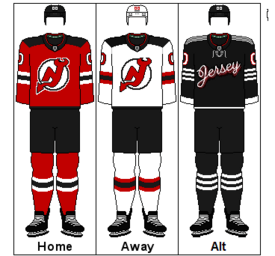 |
|
| Colors | Red, black, white |
| Media |
|
| Owner(s) |
|
| General manager | Tom Fitzgerald |
| Head coach | Sheldon Keefe |
| Captain | Nico Hischier |
| Minor league affiliates | Utica Comets (AHL) Adirondack Thunder (ECHL) |
| Stanley Cups | 3 (1994–95, 1999–00, 2002–03) |
| Conference championships | 5 (1994–95, 1999–00, 2000–01, 2002–03, 2011–12) |
| Presidents' Trophies | 0 |
| Division championships | 9 (1996–97, 1997–98, 1998–99, 2000–01, 2002–03, 2005–06, 2006–07, 2008–09, 2009–10) |
The New Jersey Devils are a professional ice hockey team from Newark, New Jersey. They play in the National Hockey League (NHL) as part of the Metropolitan Division in the Eastern Conference. The team started as the Kansas City Scouts in Kansas City, Missouri, in 1974. In 1976, the Scouts moved to Denver and became the Colorado Rockies. Then, in 1982, they moved to East Rutherford, New Jersey, and got their current name, the New Jersey Devils. This name comes from the famous Jersey Devil creature.
For their first 25 years in New Jersey, the Devils played at the Meadowlands Sports Complex in East Rutherford, at an arena called Brendan Byrne Arena (later Continental Airlines Arena). Before the 2007–08 season, the team moved to the Prudential Center in Newark. The Devils are owned by Harris Blitzer Sports & Entertainment (HBSE), with Josh Harris and David Blitzer buying the team in 2013.
The team struggled for its first eight years before moving to New Jersey, and for five more years after that. They didn't make the Stanley Cup playoffs and usually finished last in their division. Things started to change when Lou Lamoriello became their general manager in 1987. Under his leadership, the Devils made the playoffs almost every year between 1988 and 2012. They even had 13 playoff appearances in a row from 1997 to 2010.
The Devils have won the Atlantic Division title nine times. In 2013, they moved to the new Metropolitan Division. The Devils have played in the Stanley Cup Final five times. They won the Stanley Cup in 1995, 2000, and 2003. They lost in the finals in 2001 and 2012. The Devils were known for their strong defense, and they helped make the "neutral zone trap" a popular strategy in the mid-1990s.
The Devils have big rivalries with their nearby teams: the New York Rangers (across the Hudson River) and the Philadelphia Flyers. The Devils are one of three NHL teams in the New York metropolitan area, along with the Rangers and the New York Islanders. They are also one of four major sports teams that play in New Jersey, alongside the National Football League's New York Giants and New York Jets, and Major League Soccer's New York Red Bulls. Since the New Jersey Nets basketball team moved to Brooklyn in 2012, the Devils are the only major league team that represents only the state of New Jersey.
Contents
Team History
Early Years: Kansas City and Colorado
In 1972, the NHL decided to add two new teams. One of these was in Kansas City, Missouri, owned by Edwin G. Thompson's group. The team was named the Scouts after a famous statue in Kansas City. In their first season (1974–75), the Scouts had to wait for their arena to be ready. They didn't win a game until their tenth try, beating the Washington Capitals. They finished last in their division. The next season, they had a 27-game streak without a win. The Scouts also had trouble getting fans to their games.
After two seasons, the team moved to Denver in 1976 and became the Colorado Rockies. They won their first game as the Rockies against the Toronto Maple Leafs. In the 1976–77 season, they almost made the playoffs but then went 18 games without a win. The next season, they improved and made the playoffs, but the Philadelphia Flyers quickly eliminated them.
The team had many coaches during its first eight years, with none staying for two full seasons. The Rockies never won more than 22 games in a season and didn't return to the playoffs after 1978. In 1978, the team was sold to Arthur Imperatore, who wanted to move them to New Jersey. However, their new arena wasn't ready, so they stayed in Denver. In 1982, the Rockies were sold to John McMullen, and the team finally moved to New Jersey.
New Jersey: Building a Strong Team (1982–1993)
On June 30, 1982, the team was renamed the New Jersey Devils. The name came from the legend of the Jersey Devil, a creature said to live in the New Jersey Pine Barrens. Over 10,000 people voted in a contest to choose the name. The team started playing in East Rutherford, New Jersey, at the Brendan Byrne Arena. This arena was later renamed the Continental Airlines Arena and then the Izod Center. The Devils played there until the 2006–07 season.
Their first game as the Devils was a 3–3 tie against the Pittsburgh Penguins. Their first win came against the Rangers. In their first season, they finished near the bottom of their division. In November 1983, after a big loss to the Edmonton Oilers, superstar Wayne Gretzky famously called the Devils a "Mickey Mouse operation." Many Devils fans wore Mickey Mouse gear to the next game against the Oilers. In the 1983–84 season, the Devils hosted the NHL All-Star Game.
The Devils slowly built a team with players like John MacLean, Bruce Driver, Ken Daneyko, Kirk Muller, and Pat Verbeek. Their record improved each season, but they still couldn't reach the playoffs. In 1987, Lou Lamoriello became the team president and general manager.
The 1987–88 season was the Devils' first winning season. On the last day, they were tied with the Rangers for the final playoff spot. John MacLean scored the winning goal in overtime against the Chicago Blackhawks, sending the Devils to the playoffs for the first time. They made it all the way to the conference finals but lost to the Boston Bruins. During this series, coach Jim Schoenfeld had a famous argument with a referee.
The next season, the Devils missed the playoffs. Lamoriello then signed two Soviet stars, Viacheslav Fetisov and Sergei Starikov, who were finally allowed to leave their country. The team changed coaches several times over the next few seasons. In 1993, Jacques Lemaire became the head coach.
Becoming Champions (1993–2000)
Under Coach Lemaire, the Devils became a top team. In the 1993–94 season, they had a strong lineup with defensemen Scott Stevens, Scott Niedermayer, and Ken Daneyko, and goalies Chris Terreri and rookie Martin Brodeur. Brodeur won the Calder Memorial Trophy as the NHL's best rookie. The Devils set a team record with 106 points. They faced the New York Rangers in the conference finals, losing in a tough seven-game series.
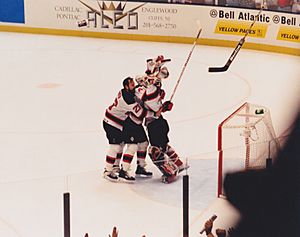
Despite that loss, the Devils returned to the conference finals in the 1994–95 season. They defeated the Philadelphia Flyers and then swept the favored Detroit Red Wings to win their first-ever Stanley Cup! This was a special moment, as they brought the Cup across the Hudson River after the Rangers had won it the year before. The 1995 Devils were the first team to let players have a day with the Stanley Cup, a tradition that continues today. Claude Lemieux was named the playoffs MVP. This success happened even though there were rumors the team might move to Nashville.
The Devils missed the playoffs by a small margin the next season. However, for the rest of the 1990s, they won their division and were the top team in the Eastern Conference for three seasons. But they couldn't make a deep playoff run. Coach Lemaire resigned in 1998 and was replaced by Robbie Ftorek.
Late in the 1999–2000 season, General Manager Lamoriello fired Ftorek and brought in assistant coach Larry Robinson. The Devils then went on a great playoff run, beating the Florida Panthers, Toronto Maple Leafs, and Philadelphia Flyers. In the finals, they won their second Stanley Cup, defeating the defending champion Dallas Stars in six games. Key players like Stevens, Holik, Niedermayer, Daneyko, and Brodeur were joined by new stars like Patrik Elias, Petr Sykora, Jason Arnott, Alexander Mogilny, and rookie Scott Gomez. The Devils made an amazing comeback in the conference finals, winning three straight games after being down 3–1 against the Flyers. Scott Stevens won the Conn Smythe Trophy as playoffs MVP.
In 2000, the team was sold to Puck Holdings.
Another Cup and New Home (2001–2013)
In the 2000–01 season, led by the "A Line" (Elias, Arnott, Sykora) and Brodeur's amazing goaltending, the Devils won their division and finished as the top team in the East. They reached the Stanley Cup Final for the second year in a row but lost to the Colorado Avalanche in seven games. In the 2001–02 season, they were eliminated in the first round of the playoffs.
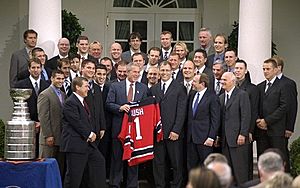
Before the 2002–03 season, the Devils traded Arnott and Sykora for players like Joe Nieuwendyk and Jamie Langenbrunner. These new players helped the team finish first in their division. Their playoff journey included wins over Boston and Tampa Bay, and a thrilling Game 7 victory over the Ottawa Senators in the conference finals. In the Stanley Cup Final, the Devils faced the Mighty Ducks of Anaheim. They won their third Stanley Cup in Game 7 at home. After the win, Ken Daneyko, a fan favorite who played his whole career with the Devils, retired. Brodeur won the Vezina Trophy as the best goalie in the regular season for the first time.
In the 2003–04 season, Brodeur won the Vezina Trophy again. The Devils finished second in their division despite losing captain Scott Stevens to an injury. They lost in the first round of the playoffs. In 2004, Jeff Vanderbeek bought the team. He strongly supported building a new arena in Newark.
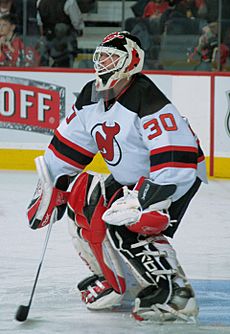
The 2004–05 season was canceled due to a lockout. Many Devils players played in European leagues. In 2005, coach Pat Burns couldn't return due to illness, and Larry Robinson became head coach again. The Devils struggled early in the 2005–06 season, but after Patrik Elias returned from illness, the team improved greatly. They finished with an 11-game winning streak, setting an NHL record. Brian Gionta set a new team record with 48 goals. The Devils swept the Rangers in the first round of the playoffs but then lost to the Carolina Hurricanes.
In 2006, the Devils hired Claude Julien as head coach. But with only three games left in the 2006–07 season, Julien was fired, and Lamoriello took over as coach again. The Devils won their division but lost to the Ottawa Senators in the second round of the playoffs. This series marked the end of their time at the Continental Airlines Arena.
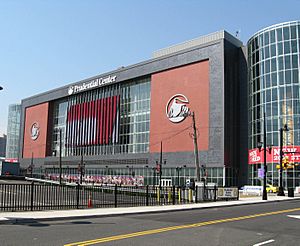
The Devils moved to their new home, the Prudential Center in Newark, in October 2007. They hired Brent Sutter as their new coach. Brodeur won the Vezina Trophy for the fourth time in five years in 2008. In the 2008–09 season, Brodeur was out for over three months with an injury, but backup goalie Scott Clemmensen played well. Brodeur returned and broke Patrick Roy's record for most regular season wins. Patrik Elias became the team's all-time leading scorer. Zach Parise had a breakout year with 45 goals. The Devils lost in Game 7 of the first round of the playoffs, with the Hurricanes scoring two late goals.
Sutter stepped down as coach, and Jacques Lemaire returned for his second time as head coach. In the 2009–10 season, the Devils traded for star player Ilya Kovalchuk. They had another 100-point season and made the playoffs for the 13th straight time. However, they were eliminated by Philadelphia in the first round.
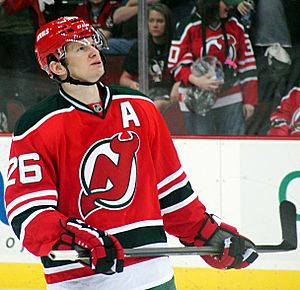
After Lemaire retired again, John MacLean became the new head coach. The Devils signed Kovalchuk to a long contract, but the NHL penalized them for it. The team struggled, and MacLean was replaced by Lemaire again. The Devils missed the playoffs for the first time since 1996, ending their 13-year streak.
In 2011, Peter DeBoer became the new head coach. His system helped the team's offense. Kovalchuk, Elias, Clarkson, and captain Zach Parise all scored 30 or more goals. Rookie Adam Henrique had a great season. As the sixth seed in the Eastern Conference, the Devils defeated Florida, then beat rivals Flyers and Rangers to reach the finals. They faced the Los Angeles Kings in the Final. The Devils lost the first three games but won the next two before losing Game 6.
In 2012, Zach Parise left the Devils to sign with the Minnesota Wild. Bryce Salvador became the new captain. The Devils missed the playoffs in the lockout-shortened 2012–13 season.
New Ownership and Recent Years (2013–Present)
The Devils faced financial problems, leading owner Jeff Vanderbeek to sell the team. In August 2013, Josh Harris and David Blitzer, who also own the Philadelphia 76ers, bought the team for over $320 million. After the sale, Kovalchuk announced he was retiring from the NHL to return to Russia. David Clarkson also left. To help the offense, the Devils signed veteran Jaromir Jagr, who, at 41, led the team in scoring in the 2013–14 season. They also acquired goalie Cory Schneider from Vancouver. Schneider shared goaltending duties with the legendary Martin Brodeur. Despite Schneider's strong play, the Devils missed the playoffs. In 2014, Brodeur, who had played his entire 21-year career with the Devils, left the team and later retired.
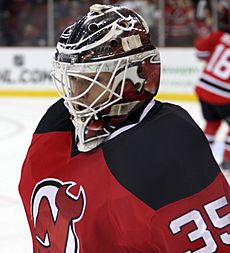
The 2014–15 season was tough due to injuries. Coach Peter DeBoer was fired in December. Scott Stevens and Adam Oates became co-head coaches, with Lamoriello overseeing them. The Devils finished near the bottom of the league and missed the playoffs again.
In 2015, Ray Shero became the new general manager, and John Hynes was named head coach. Lamoriello left to become general manager of the Toronto Maple Leafs. Shero traded for Kyle Palmieri, who became an important forward. In the 2015–16 season, the Devils missed the playoffs for the fourth straight year. The next season, they traded for Taylor Hall but still finished last in the Eastern Conference. However, they won the draft lottery and picked Nico Hischier first overall in the 2017 draft.
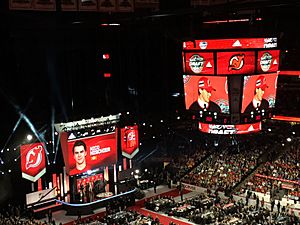
In the 2017–18 season, the team had a great start. Hall set a franchise record for points in consecutive games and finished sixth in the NHL in points. He was nominated for the Hart Memorial Trophy (league MVP). With Hall's strong play and help from goalie Keith Kinkaid and rookie Hischier, the Devils made the playoffs for the first time since 2012. They lost to the Tampa Bay Lightning in the first round. After the playoffs, Hall became the first Devils player to win the Hart Memorial Trophy.
The Devils missed the playoffs in the 2018–19 season due to injuries, including Hall being sidelined. They won the draft lottery again and picked Jack Hughes first overall in the 2019 draft.
In 2019, the Devils acquired P. K. Subban, Nikita Gusev, and Wayne Simmonds. They started the 2019–20 season with a losing streak, and coach John Hynes was fired. Alain Nasreddine took over as interim coach. Hall, captain Andy Greene, and Simmonds were traded. General Manager Shero was also fired and replaced by Tom Fitzgerald. The season was stopped due to the COVID-19 pandemic, and the Devils missed the playoffs. In July 2020, Lindy Ruff was named head coach. Goalie Corey Crawford signed with the Devils but retired before playing a game. The team struggled after a COVID-19 outbreak, and Palmieri and Travis Zajac were traded. The Devils missed the playoffs for the third year in a row.
In 2021, the Devils signed defenseman Dougie Hamilton and goalies Jonathan Bernier and Tomas Tatar. However, the 2021–22 season was also disappointing, and they missed the playoffs again.
The 2022–23 season was the team's best regular season ever. They had a 13-game winning streak and set franchise records for wins (52) and points (112). This was a huge improvement from the previous season. Goalie Vitek Vanecek had a great year, and Hughes, Hischier, Hamilton, and Jesper Bratt all had impressive offensive seasons. Hughes set a franchise record with 99 points. The Devils also acquired All-Star forward Timo Meier. In the first round of the 2023 Stanley Cup playoffs, they faced their rivals, the New York Rangers. After losing the first two games at home, the Devils came back to win the series in seven games, thanks to rookie goalie Akira Schmid. They reached the second round for the first time since 2012 but were defeated by the Carolina Hurricanes.
In the 2023–24 season, the Devils played in the 2024 Stadium Series at MetLife Stadium in February 2024, beating the Philadelphia Flyers 6–3 in front of over 70,000 fans. This was their first game at the Meadowlands since 2007. However, the season was disappointing, and the Devils missed the playoffs.
Season Records
This is a short list of the Devils' recent seasons. For a full history, see List of New Jersey Devils seasons.
Note: GP = Games played, W = Wins, L = Losses, OTL = Overtime Losses, Pts = Points, GF = Goals for, GA = Goals against
| Season | GP | W | L | OTL | Pts | GF | GA | Finish | Playoffs |
| 2020–21 | 56 | 19 | 30 | 7 | 45 | 145 | 194 | 7th, East | Did not qualify |
| 2021–22 | 82 | 27 | 46 | 9 | 63 | 248 | 307 | 7th, Metropolitan | Did not qualify |
| 2022–23 | 82 | 52 | 22 | 8 | 112 | 291 | 226 | 2nd, Metropolitan | Lost in second round, 1–4 (Hurricanes) |
| 2023–24 | 82 | 38 | 39 | 5 | 81 | 264 | 283 | 7th, Metropolitan | Did not qualify |
| 2024–25 | 82 | 42 | 33 | 7 | 91 | 242 | 222 | 3rd, Metropolitan | Lost in first round, 1–4 (Hurricanes) |
Team Identity
Jerseys
The Devils' team colors are red, black, and white. These colors are on both their home and away jerseys. The home jersey is mostly red. It has black and white stripes on the arms and used to have them around the waist. The away jersey is white with black and red stripes. Both uniforms have black on the shoulders.
Before the 1992–93 season, the uniforms were green and red. Fans sometimes called them "Christmas colors." Green was chosen to represent New Jersey's nickname, "The Garden State," and the New Jersey Pine Barrens, where the Jersey Devil legend comes from.
For many years, the Devils didn't have a third jersey. General Manager Lou Lamoriello believed a team should have only one main identity. However, the Devils did wear their classic red, white, and green jerseys for special games, like on Saint Patrick's Day or in the 2014 Stadium Series.
In 2017, the Devils updated their uniforms. The new jerseys, made by Adidas, removed the stripes from the bottom and made the sleeve stripes thicker. In the 2020–21 season, the Devils introduced a "Reverse Retro" jersey. This jersey used the original 1982–1992 design but with green as the main color.
In 2021, the Devils finally unveiled a full-time alternate jersey. This one is black with white stripes and "Jersey" written in white on the front. Devils legend Martin Brodeur helped design it, inspired by New Jersey's hockey history. In the 2022–23 season, another "Reverse Retro" jersey was released. It was white with red, navy, and gold stripes, honoring the team's past as the Kansas City Scouts and Colorado Rockies.
For the 2024 Stadium Series, the Devils wore a red and black uniform without white trim. Their "NJ" logo was made bigger and didn't have the circle around it.
Team Logo
The Devils' logo is the letters "N" and "J" joined together. The "J" has devil horns at the top and a pointed tail at the bottom. When the team first moved to New Jersey, the logo was red with a green outline. In 1992, the outline changed to black because it was hard to keep the green color consistent on the jerseys. The logo is inside an open black circle and is placed on a white background in the middle of both uniforms.
Team Mascot
The Devils' mascot is "NJ Devil." He is a 7-foot-tall devil who represents the Jersey Devil myth. NJ Devil gets the crowd excited, signs autographs, and skates on the ice during games. Before 1993, the mascot was "Slapshot," a large hockey puck. The person inside the costume resigned due to a legal issue, and Slapshot was retired.
Team Traditions
Arlette Roxburgh has been the team's main national anthem singer at home games since 1996, and fans love her. Pete Cannarozzi has been the team's organist since 2001. His music helps connect the team's history from the Meadowlands to the Prudential Center.
Some of the loudest fans at Prudential Center are in Sections 233 and 122. These groups call themselves the "Crazies" and the "Diablos." The 233 Crazies started in 1993 at the Meadowlands. They wear special jerseys with their section number and "CRAZIES" on the back. They are known for their chants and energetic behavior. The Diablos in Section 122 were created to encourage a European-style fan section.
Mark Baumann, known as "Baumann" to fans, is a long-time season ticket holder. He is famous for starting the "D-E-V-I-L-S" chant, which began in 1995. He often wears a white Devils jersey with his name and the number 00.
Team Rivalries
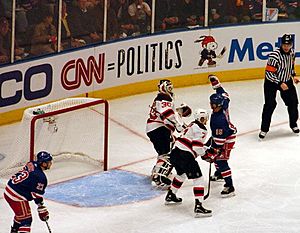
The Devils have strong rivalries with two teams because they are close by and often play each other in the playoffs. The "Battle of the Hudson River" is with the New York Rangers. The Devils' arenas are less than ten miles from Madison Square Garden and across the Hudson River. New Jersey's closeness to Pennsylvania also created a rivalry with the Philadelphia Flyers, called the "Battle of the Jersey Turnpike." The Flyers have many fans in South Jersey.
Style of Play
The Devils have been known as a defense-first team since coach Jacques Lemaire's first time with the team. Lemaire taught the Devils a system called the "neutral zone trap." This system forces opposing teams to lose the puck in the middle of the ice, allowing the Devils to counterattack. Some media and hockey fans criticized this style for "making the NHL boring." However, the Devils were very successful with it.
Under coach Brent Sutter, the team played a more aggressive, attacking style. This led to more high-scoring games. However, when Lemaire returned as coach, the Devils went back to a more defense-focused style.
After Lemaire retired again, Peter DeBoer became coach. The team's offense improved, and they played a more aggressive forecheck. After DeBoer was fired, Adam Oates and Scott Stevens became co-head coaches and also focused on improving the offense. Then, John Hynes became head coach and wanted a "fast, attacking" style of play to score more goals. Hynes was replaced by Alain Nasreddine, who kept a similar strategy. In 2021, Lindy Ruff became coach. Under Ruff, the Devils played a fast-paced style that showed off their young, speedy players. Ruff was replaced by Travis Green during the 2023–24 season, who continued a similar style but focused on a stronger mindset for the players.
Players and Staff
Retired Numbers
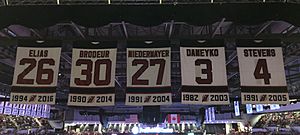
The Devils have retired five numbers to honor special players.
| No. | Player | Position | Career | Date of retirement |
|---|---|---|---|---|
| 3 | Ken Daneyko 1 | D | 1982–2003 | March 24, 2006 |
| 4 | Scott Stevens 2 | D | 1991–2005 | February 3, 2006 |
| 26 | Patrik Elias 3 | LW | 1994–2016 | February 24, 2018 |
| 27 | Scott Niedermayer 4 | D | 1991–2004 | December 16, 2011 |
| 30 | Martin Brodeur 5 | G | 1990–2014 | February 9, 2016 |
Notes:
- 1 Daneyko played the most games for the Devils (1,283) and spent his entire career with the team.
- 2 Stevens played 13 seasons with the Devils and was captain for 12 of those years, leading all three Stanley Cup-winning teams.
- 3 Elias was the first forward to have his number retired. He played his entire career with the Devils and holds team records for goals, assists, and points.
- 4 Niedermayer played his first 13 seasons with the Devils and won the James Norris Memorial Trophy in 2004.
- 5 Brodeur holds many NHL records for goalies, including most wins (691), shutouts (125), and games played (1266). He won the Vezina Trophy four times with the Devils.
- The NHL retired Wayne Gretzky's No. 99 for all teams in 2000.
Hall of Fame Honorees
Twelve Devils players have been inducted into the Hockey Hall of Fame. These include:
- Peter Stastny (1989–1993, inducted 1998)
- Viacheslav Fetisov (1989–1995, inducted 2001)
- Scott Stevens (1991–2004, inducted 2007)
- Igor Larionov (2003–2004, inducted 2008)
- Doug Gilmour (1996–1998, inducted 2011)
- Joe Nieuwendyk (2001–2003, inducted 2011)
- Brendan Shanahan (1987–1991, 2008–2009, inducted 2013)
- Scott Niedermayer (1992–2004, inducted 2013)
- Phil Housley (1996, inducted 2015)
- Dave Andreychuk (1996–1999, inducted 2017)
- Martin Brodeur (1991–2014, inducted 2018)
- Alexander Mogilny (2000–2006, inducted 2025)
Lou Lamoriello, the Devils' president and general manager for many years (1987–2015), was inducted into the Hall as a "Builder" in 2009. Two Devils head coaches, Herb Brooks (1992–1993, inducted 2006) and Pat Burns (2002–2004, inducted 2014), are also in the Hall of Fame. Longtime Devils broadcaster Mike Emrick received an award in 2008.
Some Devils head coaches were inducted as players before coaching the team:
- Jacques Lemaire (coached 1993–1998, 2009–2011, inducted 1984 as player)
- Larry Robinson (coached 2000–2002, 2005, inducted 1995 as player)
- Adam Oates (coached 2014–2015, inducted 2012 as player)
Devils Ring of Honor
In the 2016–17 season, the Devils created a "Ring of Honor" to recognize important players and staff whose numbers aren't retired.
- John McMullen, the team owner from 1982 to 2000, was the first person inducted on January 6, 2017.
- Sergei Brylin, a defensive forward who played for the Devils from 1995 to 2008 and won three Stanley Cups, was inducted on January 20, 2024.
- Jacques Lemaire, who coached the Devils to their first Stanley Cup in 1995, was inducted on January 22, 2025.
Team Captains
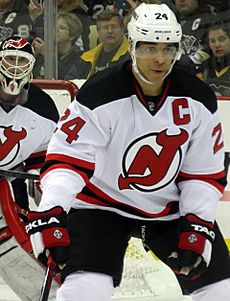
This list shows the captains since the team moved to New Jersey.
- Don Lever, 1982–1984
- Mel Bridgman, 1984–1987
- Kirk Muller, 1987–1991
- Bruce Driver, 1991–1992
- Scott Stevens, 1992–2004
- Scott Niedermayer, 2004
- Patrik Elias, 2006–2007
- Jamie Langenbrunner, 2007–2011
- Zach Parise, 2011–2012
- Bryce Salvador, 2013–2015
- Andy Greene, 2015–2020
- Nico Hischier, 2021–present
General Managers
- Bill MacMillan, 1982–1983
- Max McNab, 1983–1987
- Lou Lamoriello, 1987–2015
- Ray Shero, 2015–2020
- Tom Fitzgerald, 2020–present
Head Coaches
- Bill MacMillan, 1982–1983
- Tom McVie, 1983–1984
- Doug Carpenter, 1984–1988
- Jim Schoenfeld, 1988–1989
- John Cunniff, 1989–1991
- Tom McVie, 1991–1992
- Herb Brooks, 1992–1993
- Jacques Lemaire, 1993–1998
- Robbie Ftorek, 1998–2000
- Larry Robinson, 2000–2002
- Kevin Constantine, 2002
- Pat Burns, 2002–2005
- Larry Robinson, 2005
- Lou Lamoriello, 2005–2006
- Claude Julien, 2006–2007
- Lou Lamoriello, 2007
- Brent Sutter, 2007–2009
- Jacques Lemaire, 2009–2010
- John MacLean, 2010
- Jacques Lemaire, 2010–2011
- Peter DeBoer, 2011–2014
- Adam Oates and Scott Stevens (co-head coaches), 2014–2015
- John Hynes, 2015–2019
- Alain Nasreddine, 2019–2020
- Lindy Ruff, 2020–2024
- Travis Green, 2024
- Sheldon Keefe, 2024–present
First-Round Draft Picks
This list shows players the Devils picked in the first round of the NHL draft.
- 1982: Rocky Trottier (8th), Ken Daneyko (18th)
- 1983: John MacLean (6th)
- 1984: Kirk Muller (2nd)
- 1985: Craig Wolanin (3rd)
- 1986: Neil Brady (3rd)
- 1987: Brendan Shanahan (2nd)
- 1988: Corey Foster (12th)
- 1989: Bill Guerin (5th), Jason Miller (18th)
- 1990: Martin Brodeur (20th)
- 1991: Scott Niedermayer (3rd), Brian Rolston (11th)
- 1992: Jason Smith (18th)
- 1993: Denis Pederson (13th)
- 1994: Vadim Sharifijanov (25th)
- 1995: Petr Sykora (18th)
- 1996: Lance Ward (10th)
- 1997: Jean-Francois Damphousse (24th)
- 1998: Mike Van Ryn (26th), Scott Gomez (27th)
- 1999: Ari Ahonen (27th)
- 2000: David Hale (22nd)
- 2001: Adrian Foster (28th)
- 2003: Zach Parise (17th)
- 2004: Travis Zajac (20th)
- 2005: Niclas Bergfors (23rd)
- 2006: Matt Corrente (30th)
- 2008: Mattias Tedenby (24th)
- 2009: Jacob Josefson (20th)
- 2011: Adam Larsson (4th)
- 2012: Stefan Matteau (29th)
- 2014: John Quenneville (30th)
- 2015: Pavel Zacha (6th)
- 2016: Michael McLeod (12th)
- 2017: Nico Hischier (1st)
- 2018: Ty Smith (17th)
- 2019: Jack Hughes (1st)
- 2020: Alexander Holtz (7th), Dawson Mercer (18th), Shakir Mukhamadullin (20th)
- 2021: Luke Hughes (4th), Chase Stillman (29th)
- 2022: Simon Nemec (2nd)
- 2024: Anton Silayev (10th)
Team Records
Top Scorers in Team History
These are the top ten players with the most points in the team's history (including Kansas City, Colorado, and New Jersey).
- * – current Devils player
Note: Pos = Position; GP = Games played; G = Goals; A = Assists; Pts = Points; P/G = Points per game
| Player | Pos | GP | G | A | Pts | P/G |
|---|---|---|---|---|---|---|
| Patrik Elias | LW | 1,240 | 408 | 617 | 1,025 | .83 |
| John MacLean | RW | 934 | 347 | 354 | 701 | .75 |
| Travis Zajac | C | 1,024 | 202 | 348 | 550 | .54 |
| Kirk Muller | LW | 556 | 185 | 335 | 520 | .94 |
| Scott Gomez | C | 606 | 123 | 361 | 484 | .80 |
| Scott Niedermayer | D | 892 | 112 | 364 | 476 | .53 |
| Bobby Holik | C | 786 | 202 | 270 | 472 | .60 |
| Aaron Broten | C | 641 | 162 | 307 | 469 | .73 |
| Jesper Bratt* | LW | 552 | 150 | 297 | 447 | .81 |
| Scott Stevens | D | 956 | 93 | 337 | 430 | .45 |
| Player | Pos | G |
|---|---|---|
| Patrik Elias | LW | 408 |
| John MacLean | RW | 347 |
| Bobby Holik | LW | 202 |
| Travis Zajac | C | 202 |
| Zach Parise | RW | 194 |
| Kirk Muller | LW | 185 |
| Nico Hischier* | C | 171 |
| Pat Verbeek | RW | 170 |
| Petr Sykora | RW | 166 |
| Aaron Broten | C | 162 |
| Player | Pos | A |
|---|---|---|
| Patrik Elias | LW | 617 |
| Scott Niedermayer | D | 364 |
| Scott Gomez | C | 361 |
| John MacLean | RW | 354 |
| Travis Zajac | C | 348 |
| Scott Stevens | D | 337 |
| Kirk Muller | LW | 335 |
| Bruce Driver | D | 316 |
| Aaron Broten | C | 307 |
| Jesper Bratt* | LW | 297 |
Individual and Team Records
Career Records
- Most games played – Ken Daneyko, 1,283
- Most goals – Patrik Elias, 408
- Most assists – Patrik Elias, 617
- Most points – Patrik Elias, 1,025
- Most penalty minutes – Ken Daneyko, 2,516
- Most wins (goaltender) – Martin Brodeur, 688
Regular Season Records
- Most goals in a season – Brian Gionta, 48 (2005–06)
- Most assists in a season – Jesper Bratt, 67 (2024–25)
- Most points in a season – Jack Hughes, 99 (2022–23)
- Most penalty minutes in a season – Krzysztof Oliwa, 295 (1997–98)
- Most wins in a season (goaltender) – Martin Brodeur, 48 (2006–07)
- Most power play goals in a season – Brian Gionta, 24 (2005–06)
Playoff Records
- Most goals in a playoff season – Claude Lemieux, 13 (1995)
- Most goals by a defenseman in a playoff season – Brian Rafalski, 7 (2001)
- Most assists in a playoff season – Scott Niedermayer, 16 (2003)
- Most points in a single playoff game – Patrik Sundstrom, 8 (April 22, 1988; also an NHL record)
- Most points in a playoff season – Patrik Elias, 23 (2001)
- Most points by a defenseman in a playoff season – Brian Rafalski and Scott Niedermayer, 18 (2001, 2003)
- Most penalty minutes in a playoff season – Perry Anderson, 113 (1988)
Team Records
- Most consecutive wins in a season – 13 (2000–01, 2022–23)
- Most points in a season – 112 (2022–23)
- Most wins in a season – 52 (2022–23)
- Longest season-ending win streak – 11 (2005–06)
Affiliate Teams
American Hockey League (AHL)
The Devils have had several minor league teams in the American Hockey League (AHL).
- The Maine Mariners were their first AHL team (1982–1987).
- The team then moved and became the Utica Devils (1987–1993).
- Next were the Albany River Rats (1993–2006).
- In 2006, the Devils bought a team and named them the Lowell Devils (2006–2010).
- They moved again to become the Albany Devils (2010–2017).
- After that, they became the Binghamton Devils (2017–2021).
- Since 2021, their AHL affiliate has been the Utica Comets.
ECHL
In 2006, the Devils bought an ECHL team called the Trenton Titans and renamed them the Trenton Devils. After four seasons, the Devils stopped operating this team in 2011. In 2017, the Devils announced a partnership with the Adirondack Thunder for the 2017–18 season.
Television and Radio
Television: MSGSN
- Bill Spaulding – play-by-play announcer
- Ken Daneyko – color commentator
- Bryce Salvador – color commentator and studio analyst
- Rachel Herzog – TV host
Radio: Audacy (formerly Radio.com), WFAN (selected games)
- Matt Loughlin – play-by-play announcer
- Chico Resch – color commentator
See also
 In Spanish: New Jersey Devils para niños
In Spanish: New Jersey Devils para niños
 | Shirley Ann Jackson |
 | Garett Morgan |
 | J. Ernest Wilkins Jr. |
 | Elijah McCoy |


